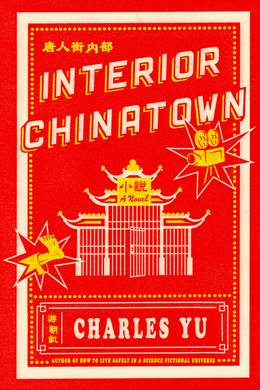Book Review: Interior Chinatown by Charles Yu

This book has been on my to-read list for a while. I’ve been a pretty big fan of Charles Yu’s short stories for their orignal formats - “Fable” was told as a series of narrative exercises during a therapy session, “Hero Absorbs Major Damage” was told as an RPG with side commentary from an ancillary character in its publication on Electric Literature - their creative settings, and their deep explorations of human emotion. They’re basically the epitome of Viktor Shklovsky’s idea of defamiliarization.
Interior Chinatown is structured as a screenplay about Willis Wu, Generic Asian Man, as he attempts to earn the coveted title of Kung Fu Man. His reality slides between his real life with his parents and then his wife and daugher, and a police procedural in which he assists an investigation to discover where Older Brother has gone. It was honestly pretty confusing at first to figure out what the characters’ reality was, but the book does a pretty good job teaching the reader not to think too hard about it. The generic roles of the Asian characters are the focus, how they never seem to get starring roles, and even when they think they do, they’re still just stereotypes. What’s really happening in Willis’ life isn’t the point because it’s all happening.
I marvelled at how complicated it must have been to write a book like this. Yu weaves in and out of reality seamlessly and manages to coalesce all the ideas neatly in the climactic court scene at the end. It just flows and the reader has to let the book take them or else drown trying to untangle the different strands of Willis’ life. It took at least a solid quarter of the book to figure out how to read the narrative and for that I think it could bear a re-read just to admire how it’s put together. That said, I was a little disoriented until I grew accustomed to the conceit.
Yu lands his point about how the Asian-American plight is different from the African-American plight and how Asians have to allow themselves to object to their own oppression. The book worked well overall. I think his short stories tend to be more impactful, but his novels, now that I’ve read both of them so far, are broader explorations of a character’s life and of the narrative structures. I appreciate the extent to which he can use those structures, as confusing as they were at times in this book, to examine his themes, and I’m curious to see what he comes up with next.